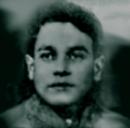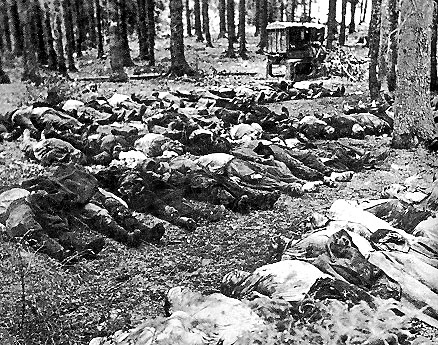דרעמלען פֿײגל אױף די צװײַן,
שלאָף, מײַן טײַער קינד
בײַ דײַן װיגל אױף דײַן נאַרע
זיץט אַ פֿרעמדע און זינגט
ליו־ליו, ליו־ליו, ליו
ס'איז דײַא װיגל װוּס געשטאַנען
אױסגעפֿלאָכטן פֿון גליק
און דײַן מאַמע, אױ דײַן מאַמע
קומט שױן קײן מאָל ניט צוריק
ליו־ליו, ליו־ליו, ליו
כ'האָב געזען דײַן טאַטן לױפֿן
אונטער האָגל פֿון שטײן
איבער פֿעלדער איז געפֿלױגן
זײן פאַריתומטער געװײן
ליו־ליו, ליו־ליו, ליו
שלאָף, מײַן טײַער קינד
בײַ דײַן װיגל אױף דײַן נאַרע
זיץט אַ פֿרעמדע און זינגט
ליו־ליו, ליו־ליו, ליו
ס'איז דײַא װיגל װוּס געשטאַנען
אױסגעפֿלאָכטן פֿון גליק
און דײַן מאַמע, אױ דײַן מאַמע
קומט שױן קײן מאָל ניט צוריק
ליו־ליו, ליו־ליו, ליו
כ'האָב געזען דײַן טאַטן לױפֿן
אונטער האָגל פֿון שטײן
איבער פֿעלדער איז געפֿלױגן
זײן פאַריתומטער געװײן
ליו־ליו, ליו־ליו, ליו
envoyé par Bartleby + CCG/AWS Staff - 23/2/2011 - 15:42
Langue: yiddish
La trascrizione in caratteri latini.
DREMLEN FEYGL
Dremlen feygl af di tsvayn,
Shlof, mayn tayer kind
Bay dayn vigl af dayn nare
Zitst a fremde un zingt
Lyu-lyu, lyu-lyu, lyu
S'iz dayn vigl vus geshtanen
Oysgeflokhtn fun glik
Un dayn mame, oy dayn mame
Kumt shoyn keyn mol nit tsurik
Lyu-lyu, lyu-lyu, lyu
Kh'hob gezen dayn tatn loyfn
Unter hogl fun shteyn
Iber felder iz gefloygn
Zayn faryosemter geveyn
Lyu-lyu, lyu-lyu, lyu
Dremlen feygl af di tsvayn,
Shlof, mayn tayer kind
Bay dayn vigl af dayn nare
Zitst a fremde un zingt
Lyu-lyu, lyu-lyu, lyu
S'iz dayn vigl vus geshtanen
Oysgeflokhtn fun glik
Un dayn mame, oy dayn mame
Kumt shoyn keyn mol nit tsurik
Lyu-lyu, lyu-lyu, lyu
Kh'hob gezen dayn tatn loyfn
Unter hogl fun shteyn
Iber felder iz gefloygn
Zayn faryosemter geveyn
Lyu-lyu, lyu-lyu, lyu
envoyé par Bartleby - 24/5/2013 - 03:13
Langue: italien
Traduzione italiana di Riccardo Venturi
25 maggio 2013
25 maggio 2013
Eseguita direttamente sul testo yiddish.
SONNECCHIANO GLI UCCELLI
Sonnecchiano gli uccelli sui rami,
dormi, bambino mio diletto.
Accanto alla tua culla, nel tuo piccolo nido
c'è uno straniero e canta:
la la la, la la la.
La tua culla che stava là
intrecciata di felicità,
e la tua mamma, oh, la tua mamma
non ritornerà mai più.
La la la, la la la.
Ho visto tuo padre correre
sotto una grandine di pietre,
e sui campi risuonava
il suo lamento desolato.
La la la, la la la.
Sonnecchiano gli uccelli sui rami,
dormi, bambino mio diletto.
Accanto alla tua culla, nel tuo piccolo nido
c'è uno straniero e canta:
la la la, la la la.
La tua culla che stava là
intrecciata di felicità,
e la tua mamma, oh, la tua mamma
non ritornerà mai più.
La la la, la la la.
Ho visto tuo padre correre
sotto una grandine di pietre,
e sui campi risuonava
il suo lamento desolato.
La la la, la la la.
Langue: anglais
Traduzione inglese dal programma 2005 delle celebrazioni per il Yom HaShoah presso la Duke University di Durham, North Carolina.
DROWSING BIRDS
Birds sit drowsing on the branches,
Sleep, my precious child.
By your cradle in your little nest
Sings a stranger by your side:
Lu-lu, lu-lu, lu.
Here your cradle had its dwelling
Laced with happiness,
And your mother, oh, your mother,
Will return no more.
Lu-lu, lu-lu, lu.
I saw your father running
Under a hail of stones,
Flying over fields there echoed
His desolate moan.
Lu-lu, lu-lu, lu.
Birds sit drowsing on the branches,
Sleep, my precious child.
By your cradle in your little nest
Sings a stranger by your side:
Lu-lu, lu-lu, lu.
Here your cradle had its dwelling
Laced with happiness,
And your mother, oh, your mother,
Will return no more.
Lu-lu, lu-lu, lu.
I saw your father running
Under a hail of stones,
Flying over fields there echoed
His desolate moan.
Lu-lu, lu-lu, lu.
envoyé par Bartleby - 23/2/2011 - 15:43
Langue: anglais
Versione inglese di Ruth Rubin pubblicata in “Jewish Folk Songs in Yiddish and English”, 1965 ed eseguita dalla stessa Rubin nel suo disco “Jewish Folk Songs”, Folkways Records, 1959.
Il titolo indicato dalla Rubin è semplicemente “Viglid”, “Lullaby”, “Ninna nanna”.
Ho così anche appreso dalle note al disco della Rubin che Leah Rudnitski scrisse questa canzone all’indomani di una delle tante esecuzioni di massa che i nazisti e le milizie lituane effettuarono a Ponary (Ponar in yiddish), una località vicina a Vilnius dove tra il 1941 e il 1944 furono trucidate complessivamente oltre 100.000 persone, il 70% delle quali di religione ebraica.
Il 5 aprile del 1943 a Ponary furono massacrati 4.000 ebrei polacchi.
Raccontano che si salvò per caso soltanto un bimbo di tre anni: è a lui che Leah Rudnitski dedicò questa ninna nanna.
Il titolo indicato dalla Rubin è semplicemente “Viglid”, “Lullaby”, “Ninna nanna”.
Ho così anche appreso dalle note al disco della Rubin che Leah Rudnitski scrisse questa canzone all’indomani di una delle tante esecuzioni di massa che i nazisti e le milizie lituane effettuarono a Ponary (Ponar in yiddish), una località vicina a Vilnius dove tra il 1941 e il 1944 furono trucidate complessivamente oltre 100.000 persone, il 70% delle quali di religione ebraica.
Il 5 aprile del 1943 a Ponary furono massacrati 4.000 ebrei polacchi.
Raccontano che si salvò per caso soltanto un bimbo di tre anni: è a lui che Leah Rudnitski dedicò questa ninna nanna.
LULLABY
Birds are sleeping on the bough,
Sleep, my precious child.
At your cradle in the dugout,
A stranger sits and sings to you.
Your cradle once did have a home,
Woven out of happiness.
Now your Mother, oh, your Mother,
Never will return to you.
I did see your father fleeing,
Under A hail of stones.
Across the fields there flew
His bitter lonely cry.
Birds are sleeping on the bough,
Sleep, my precious child.
At your cradle in the dugout,
A stranger sits and sings to you.
Your cradle once did have a home,
Woven out of happiness.
Now your Mother, oh, your Mother,
Never will return to you.
I did see your father fleeing,
Under A hail of stones.
Across the fields there flew
His bitter lonely cry.
envoyé par Bartleby - 16/3/2011 - 12:01
Langue: allemand
Traduzione tedesca di Barbara Boock
TRÄUMEN VÖGEL AUF DEN ZWEIGEN
Träumen Vögel auf den Zweigen,
Schlaf, mein teures Kind,
Bei deiner Wiege, nah bei dir,
Sitzt eine Fremde und singt:
Lyu-lyu, lyu-lyu, lyu.
Es ist deine Wiege wo gestanden
Ausgeflochten von Glück.
Und deine Mutter, oh, deine Mutter
Kommt ja niemals mehr zurück.
Lyu-lyu, lyu-lyu, lyu.
Ich hab gesehn deinen Vater laufen
Unter einem Hagel von Steinen.
Über Felder ist geflogen
Sein verwaistes Weinen.
Lyu-lyu, lyu-lyu, lyu.
Träumen Vögel auf den Zweigen,
Schlaf, mein teures Kind,
Bei deiner Wiege, nah bei dir,
Sitzt eine Fremde und singt:
Lyu-lyu, lyu-lyu, lyu.
Es ist deine Wiege wo gestanden
Ausgeflochten von Glück.
Und deine Mutter, oh, deine Mutter
Kommt ja niemals mehr zurück.
Lyu-lyu, lyu-lyu, lyu.
Ich hab gesehn deinen Vater laufen
Unter einem Hagel von Steinen.
Über Felder ist geflogen
Sein verwaistes Weinen.
Lyu-lyu, lyu-lyu, lyu.
envoyé par Bartleby - 16/3/2011 - 12:04
×
![]()







[1943?]
Poesia di Leah Rudnitski
Musica di Leyb Yampolski
A poem by Leah Rudnitski
Music by Leyb Yampolski
Musica di Leyb Yampolski, compositore ebreo russo.
Testo trovato sul programma 2005 delle celebrazioni per il Yom HaShoah presso la Duke University di Durham, North Carolina. *
Leah Rudnitski era una giovane e talentuosa poetessa molta attiva e molto nota nella scena culturale ebraica lituana. Prima dell’occupazione nazista faceva parte della redazione della rivista di letteratura e cultura yiddish “Vilna Emes” (La Verità di Vilnius). Non smise di scrivere poesie e canzoni nemmeno dopo l’avvento dei nazisti e, anzi, pubblicò in quel periodo una raccolta di poesie ed una di canzoni. Fu inoltre attiva nella resistenza, compiendo azioni di sabotaggio e tenendo i collegamenti con i partigiani fuori dal ghetto.
Leah Rudnitski scrisse questa ninna nanna probabilmente nel 1943, prima che il ghetto di Vilnius fosse liquidato e prima di essere catturata, insieme a Hirsh Glik, dai nazisti e mandata a morire a Treblinka.
* Il testo in caratteri ebraici è stato ricostruito a partire dal testo trascritto. [RV]